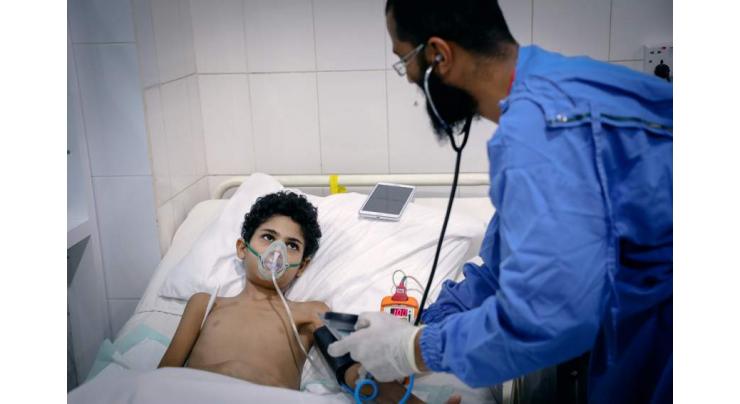
MSF Worried About Deteriorating Health Care Situation In Afghanistan - Mission Chief
Umer Jamshaid Published December 11, 2018 | 11:21 AM

Humanitarian organization Medecins Sans Frontieres (MSF, or Doctors Without Borders) is concerned over the fact that situation with health care in war-torn Afghanistan continues to further deteriorate, Djoen Besselink, the head of MSF mission for Afghanistan, told Sputnik in an interview.
KABUL (UrduPoint News / Sputnik - 11th December, 2018) Humanitarian organization Medecins Sans Frontieres (MSF, or Doctors Without Borders) is concerned over the fact that situation with health care in war-torn Afghanistan continues to further deteriorate, Djoen Besselink, the head of MSF mission for Afghanistan, told Sputnik in an interview.
The MSF is currently implementing its projects in six Afghan provinces, and the experience gained by the mission showed that over the past 10 years, the quality of medical services in the country had significantly decreased, with Afghans experiencing problems with access to medical services in the country, Besselink explained.
"So people come to our centers, they travel sometimes long hours, simply because they cannot find health care where they live. I think we had a few patients research. So 50-55 percent of our patients actually said they come to our hospitals because they cannot find any in the area where they live ... There is no stuff or lack of medication, and ... the donors' funding is getting less, there are a lot of constraints on the people," Besselink said.
According to Besselink, in the country's east, where the MSF is implementing mother and child programs, the MSF teams assist around 40 percent of the total deliveries in the province just because the organization can offer free and qualitative health care.
He added that charges for medical services were being reimposed in the country.
"It does not sound like high amounts if you look at the use of it, but if you take it into account with how much people make and how many people live below the poverty line we fear that it will ever ... and need more access to quality health care," Besselink indicated.
Besselink stated that the organization did not have data about how many people in Afghanistan have access to basic health care, but stressed that many Afghans were in dire need of it.
"So when we know how many people come to our hospitals, so we see how many people we treat and we ask our patients what is the reason you come to our hospital and you do not go to the hospital in your village or district. But it is difficult to say on a whole country level," Besselink noted.
Afghanistan has long been in a state of turmoil, with the government fighting the Taliban radical movement, which has been holding vast territories in rural areas under its control and regularly launches offensives in key big cities. The situation has been exacerbated by the activities of the Islamic State terrorist group (IS, banned in Russia), which has been operating in Afghanistan since 2015. As Afghan and foreign military have been working to put an end to fighting in the country, humanitarian organizations have been making considerable contribution to the stabilization of situation in the country.
Related Topics
Recent Stories

PTI to stage nationwide protests against alleged electoral frauds

Senate continues discussion on Presidential address to Joint Sitting of Parliame ..

Masood Khan calls for Pak-US cooperation for regional peace

Interior Minister starts Margalla Trail Patrol for security

Currency Rate In Pakistan - Dollar, Euro, Pound, Riyal Rates On 26 April 2024

Today Gold Rate in Pakistan 26 April 2024

ICC Womens T20 World Cup Qualifier, Match 2: Ireland Women open with Comfortable ..

Robinson, bowlers help New Zealand go 2-1 up against Pakistan

Shahzeb Chachar to hold khuli kachehri on April 26

Heatwave amid Israel's aggression in Gaza brings new misery, disease risk

Tourism must change, mayor says as Venice launches entry fee

Court adjourns Judicial Complex attack case till May 17
More Stories From World
-
Clean energy drives massive BHP takeover bid
16 minutes ago -
Copper price tops $10,000 for first time in two years
36 minutes ago -
Ukraine agriculture minister held for alleged corruption
45 minutes ago -
China calls Germany spy claims 'pure fabrication'
56 minutes ago -
Singapore expects 1-3 pct growth this year
1 hour ago -
Hong Kong's Hang Seng Tech Index rises over 5 pct
1 hour ago
-
New Zealand business sector R&D expenditure hits 2.21 bln USD
1 hour ago -
3 dead after mini car falls into west Japan paddy field
1 hour ago -
Chinese shares higher at midday Friday
1 hour ago -
Myanmar plans to export 2,000 tons of coffee in 2024-25 fiscal year
1 hour ago -
Chinese shares close higher Friday
1 hour ago -
Pro-Palestinian US campus protests grow as police crack down
2 hours ago